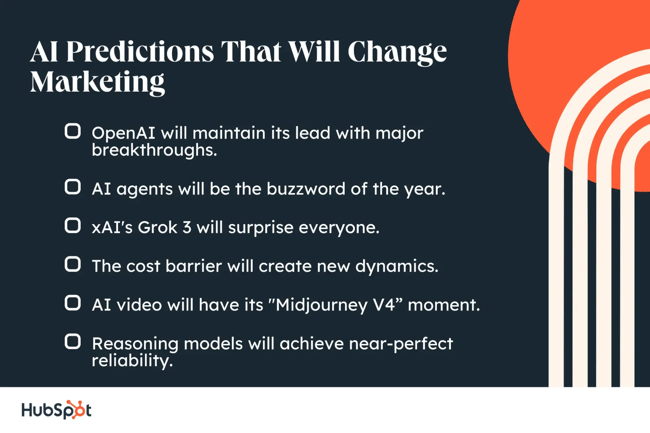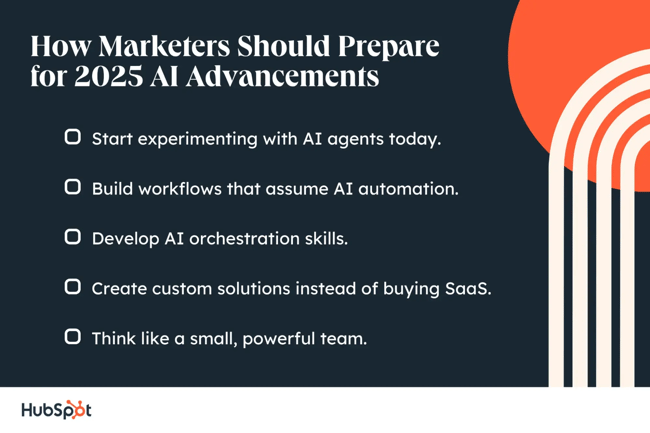For the past few months, I‘ve been deep in the trenches testing the latest AI models, spending $200 a month on ChatGPT Pro, and building games with AI that would have required entire development teams just months ago.
I’ve watched reasoning models solve problems that stump PhD mathematicians. What I’m seeing isn‘t just incremental improvement; it’s a complete phase change.
After countless hours testing ChatGPT against Claude, Gemini 2.0, and similar AI competitors, I'm convinced 2025 will be the year AI goes from “cool tool” to “fundamental infrastructure.” Here are my six predictions, as well as tactical steps marketers can take to stay ahead.
AI Predictions That Will Change Marketing

1. OpenAI will maintain its lead with major breakthroughs.
OpenAI isn’t slowing down. And by the end of 2025, I‘m convinced they’ll be even further ahead of the competition, especially for power users who need the absolute best performance. While the o3 model may be o1 with more compute, the real breakthrough is how it uses reasoning during inference. That’s what sets it apart.
I think we'll see something like Orion — a new, larger base model — launched by year’s end. Sam Altman has hinted AGI is coming in 2025, and honestly, by my definition, Pro mode already qualifies as a kind of basic AGI. Once these models combine fast response with deep reasoning, most people will call that AGI, and it will unlock everything we’ve been talking about, from autonomous agents to robot assistants.
2. AI agents will be the buzzword of the year.
My co-host Matt Wolfe called this one: Agents will be the buzzword of 2025. As he put it, every major company — Google, OpenAI, Anthropic — will be talking about agentic workflows and tool use. I completely agree with his assessment.
By year’s end, you’ll have agents that can go off and do market research, come back with slides, and show you the best strategy for approaching a market or customer segment.
I also think that email assistants will also be agents, handling our correspondence so we can focus on higher-value work. (I genuinely think hand-typed emails will be rare within two or three years.)
3. xAI's Grok 3 will surprise everyone.
xAI has been scaling fast, training on more data than nearly anyone else and buying up Nvidia chips at a staggering pace. I expect them to release Grok 3 this year, and while it may not replace ChatGPT’s advanced voice mode for me, I think it’s going to surprise a lot of people with its responsiveness and personality. Especially for casual users, Grok 3 might be the most fun to interact with.
4. The cost barrier will create new dynamics.
Let’s talk about the elephant in the room: Pricing. ChatGPT Pro is already $200 per month, and OpenAI’s CFO has said they’re exploring $2,000 per month tiers. That’s going to create a big gap between average users and power users with money.
This reminds me of my gaming days, where strategies like “multiboxing” in EverQuest gave players huge advantages. I wonder if we'll see clever people start “multi-accounting” AI to access more computational power and better results.
So the same way we formed alliances with other multiboxers to get better splits than sharing with random players, we might see AI power users pooling resources or finding creative workarounds to access premium compute.
5. AI video will have its “Midjourney V4” moment.
Matt made a great analogy during the podcast: Right now, AI video feels like we‘re at the Midjourney V2 level. As he pointed out, there was that massive leap from V3 to V4 when people started fooling others on Facebook with AI-generated images. We haven’t seen that leap with video yet, but I think 2025 will deliver it.
Current video models are trained on massive amounts of data without much reasoning about the output. Once we apply reasoning models on top of video generation — similar to what ChatGPT o3 does with text — we‘ll get dramatically better control and consistency. You’ll be able to specify exactly how you want characters to move and ensure they stay consistent throughout scenes.
6. Reasoning models will achieve near-perfect reliability.
From my testing with ChatGPT Pro, the biggest breakthrough I’ve noticed is reliability. Unlike other models that sometimes produce obvious errors (like suggesting changes that are already in your code), ChatGPT Pro consistently double-checks itself.
As we throw more at these reasoning models, I believe we‘ll approach 99.9% accuracy in the next year. That’s the difference between “interesting demo” and “tool I'd trust with important work.”
How Marketers Should Prepare for 2025 AI Advancements

If you're in marketing, the window to get ahead of this next AI wave is closing fast. Here's what you need to do now:
- Start experimenting with AI agents today. Don't wait for the “perfect” tool. Begin testing current AI models to understand their capabilities and limitations before more powerful systems become widely available.
- Build workflows that assume AI automation. Start designing processes where AI handles routine tasks like email responses, content creation, and data analysis. Focus your energy on strategy and creative direction instead of execution.
- Develop AI orchestration skills. The future marketing professional will be more like a director coordinating multiple AI tools than someone doing manual tasks. Learn to prompt engineer and manage AI systems effectively.
- Create custom solutions instead of buying SaaS. Many marketing tools can now be built in minutes using AI. I've been creating complex projects with o1 Pro, Claude, and Gemini 2.0 that would have previously required entire teams.
- Think like a small, powerful team. AI will enable small groups with concentrated focus to create projects that used to require hundreds of people. Position yourself and your team to take advantage of this leverage.
AI in 2025: The Bottom Line
We‘re entering an era where the limiting factor won’t be the technology. It will be our imagination and ability to direct these incredibly powerful tools. The companies and individuals who learn to orchestrate multiple AI systems effectively will have unprecedented advantages.
So the question is no longer about when this transformation is coming, but if you’re ready when it arrives.
To learn more about how Matt and I envision AI advancing in 2025, check out the <a href="https://www.youtube.com/watch?v%3DzAJaxQNOB74">full episode</a> of The Next Wave below:




